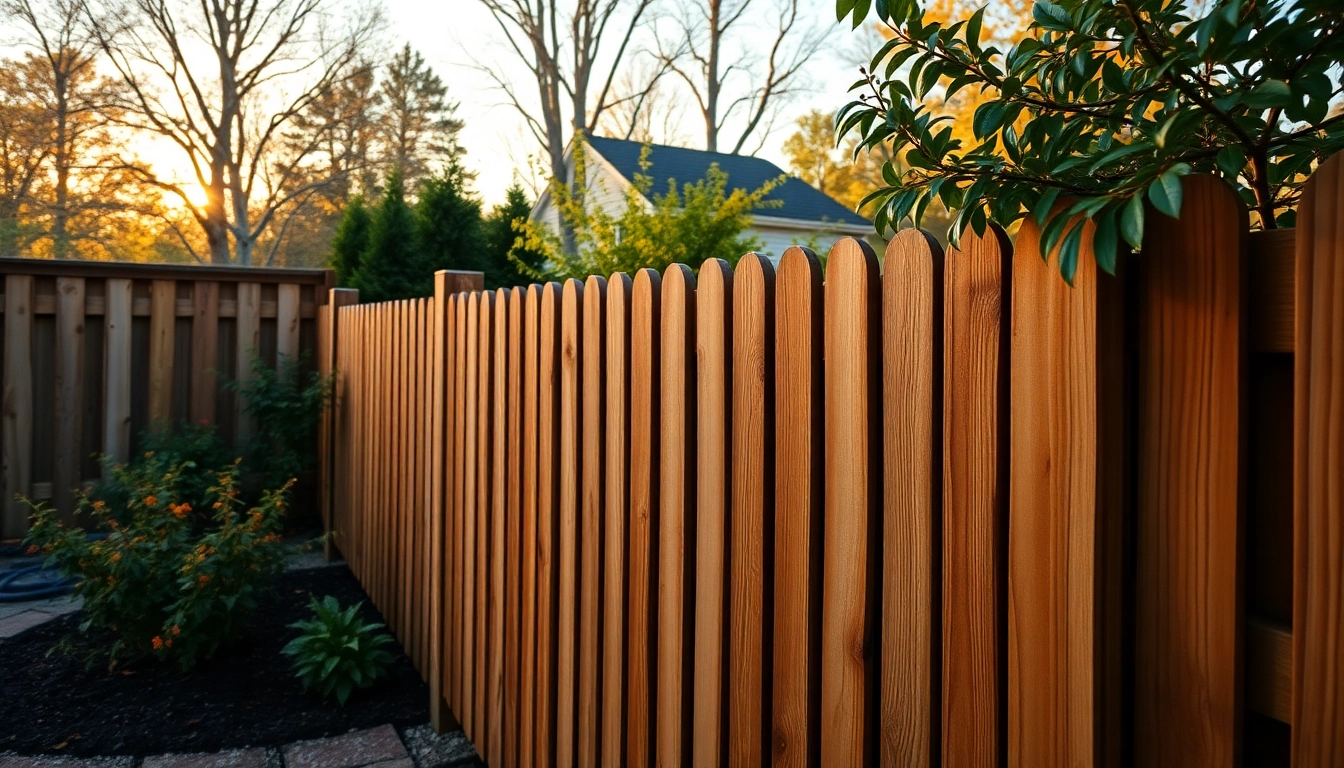Understanding Fencing Options in Manchester
Fencing plays a crucial role in defining the boundaries and aesthetics of your property. For homeowners and landlords in Manchester, understanding the various options available in the market is essential when making a choice that fits both your practical needs and design preferences. Whether you seek to enhance your property’s security, improve privacy, or simply elevate its curb appeal, exploring different fencing materials, styles, and installation options is a significant first step. This comprehensive guide delves into the various fencing options available, highlighting insights that help you make informed decisions, particularly when considering fencing companies Manchester for professional guidance.
Types of Fencing Materials Available
When choosing fencing for your property, the material you select will significantly impact its durability, maintenance requirements, and aesthetic appeal. Here are some of the most popular fencing materials available in Manchester:
- Wood Fencing: Wood is often favored for its natural appearance and versatility. It can be painted or stained in various colors and offers a timeless look. However, wood requires regular maintenance to protect against rot, termites, and weathering.
- Vinyl Fencing: Vinyl has gained popularity for its low maintenance and durability. It resists fading and staining, doesn’t require painting, and can be designed to mimic wood. However, it may not have the same classic appeal as wooden fences.
- Metal Fencing: Options like chain-link, aluminum, and wrought iron provide excellent security and durability. Metal fences typically require minimal maintenance but often come at a higher initial cost. They are perfect for commercial properties or for homeowners seeking a more modern appearance.
- Composite Fencing: Made from recycled wood and plastic, composite materials offer a sustainable alternative. They are resistant to rotting, splitting, and insect damage, providing a long-lasting solution without the environmental impact of traditional materials.
- Concrete and Masonry Fencing: These options provide the highest level of durability and security. Concrete walls or fences can be designed in various styles and heights, making them suitable for both residential and commercial applications.
Evaluating Styles: Choosing What Fits Your Property
The style of your fence should complement your property’s architecture while fulfilling your functional requirements. Here are some popular fencing styles to consider:
- Privacy Fencing: These are typically six feet or taller and made from solid materials like wood or vinyl, making them ideal for creating private outdoor spaces.
- Picket Fences: A traditional choice, picket fences add charm and character to your property. They are usually low and decorative, making them perfect for front yards and gardens.
- Ranch Fencing: Commonly used in rural areas, ranch-style fences are typically made from wood or metal rails. They serve to contain livestock while appearing rustic and open.
- Garden Fencing: Softer options that define garden spaces, these fences can be made from a variety of materials and typically stand shorter than privacy fences.
- Security Fencing: Designed for maximum security, these fences are tall, often topped with barbed wire, and constructed from heavy-duty materials like steel.
Benefits of Professional Installation
While DIY fencing installation is tempting, hiring professionals offers numerous advantages:
- Expertise: Professionals possess the know-how to handle various fencing types and styles, ensuring your fence is installed correctly and safely.
- Time-Efficiency: Experts complete fencing projects more quickly than most homeowners can, allowing you to enjoy your new installation sooner.
- Quality Materials: Professional firms often have access to high-quality materials and tools, resulting in better overall durability and performance.
- Compliance: A qualified contractor will be knowledgeable about local regulations, ensuring your fence meets all legal requirements.
- Warranty and Support: Reputable fencing companies often provide warranties on their work, giving you peace of mind in case of future issues.
Top Fencing Companies in Manchester
With a multitude of fencing companies in Manchester, selecting the right contractor can feel daunting. Researching firms thoroughly can make a significant difference in your experience and the quality of your finished project. Here are key considerations when comparing fencing companies:
Comparing Services and Prices
Every fencing company offers various types of services, from material supply to complete installation. When comparing, consider the following:
- Project Scope: Does the contractor offer both materials and installation, or do they only focus on one aspect? It’s beneficial to find a company that can do both.
- Custom Solutions: Look for companies that allow for customization to address your specific needs, whether it’s design or size modifications.
- Prices: Pricing structures can vary greatly. Acquire detailed quotes that cover all aspects of the project to avoid hidden fees later on.
- Payment Terms: Understand their payment schedule and what to expect regarding deposits and final payments.
Customer Reviews and Testimonials
Word-of-mouth recommendations and online reviews play a significant role in assessing the credibility of a fencing company. Here’s what to consider:
- Online Reviews: Reading reviews on platforms like Google, Yelp, and Trustpilot can provide insights into customer satisfaction and service quality.
- Case Studies: Some companies showcase before-and-after photos and project descriptions on their websites, allowing you to assess their capabilities.
- Direct Feedback: Asking for references from previous clients can provide firsthand accounts of the company’s professionalism and skill.
What to Look for in a Fencing Contractor
When evaluating potential fencing contractors, several key attributes should be identified to ensure a successful collaboration:
- Experience: Look for companies with considerable experience in the fencing industry, which often translates into expertise and reliability.
- Licenses and Insurance: Ensure that any contractor you consider is fully licensed and insured to operate in your area, protecting you from liability.
- Quality of Materials: Inquire about the quality of materials they use, as these will directly impact the longevity and appearance of your fence.
- Post-Installation Support: Check whether they provide support for maintenance issues or repairs after the installation is complete.
Common Challenges When Installing Fences
Installing a fence, while rewarding, can come with its share of challenges that can affect the outcome of your project. Understanding these hurdles and planning accordingly can help mitigate issues:
Pacing: Timing Your Project Right
Many factors can influence the timeline of your fencing project, including weather, contractor availability, and material sourcing. Here are tips to effectively manage your timeline:
- Schedule During Off-Peak Seasons: Late fall or early spring may offer better availability and pricing, potentially speeding up the process.
- Plan for Weather Delays: Always prepare for potential weather-related delays by allowing extra time in your project schedule.
- Have a Contingency Plan: Identify backup contractors or material suppliers to alleviate potential delays.
Understanding Local Regulations and Permits
Different areas have various zoning laws and regulations regarding fencing. Here’s how to navigate these effectively:
- Research Local Laws: Check with Manchester’s local government or planning department for specific regulations affecting height, materials, and placement.
- Obtain Necessary Permits: Ensure your contractor has the necessary permits to avoid fines and ensure compliance.
- Talk to Neighbors: Open communication with neighbors can help pave the way for a smoother installation, especially in shared boundary situations.
Dealing with Existing Structures and Terrain
Challenges like trees, slopes, or existing fences can complicate installation. Consider these strategies:
- Assessing Your Lot: Conduct a thorough evaluation of your land prior to installation, noting existing structures, slopes, and vegetation.
- Creative Solutions: Work with your contractor to develop creative solutions for uneven terrain, possibly involving tiered fencing designs or retaining walls.
- Tree Considerations: If removing trees for fencing installation, be sure to evaluate the long-term impact on your landscape; replacing trees or adding gardens can create a balanced aesthetic.
Fencing Maintenance Tips for Longevity
A fence is an investment, and like all investments, it requires care and maintenance to extend its lifespan and maintain its appearance. Here are essential tips for keeping your fence in top shape:
Seasonal Care: Best Practices for Your Fence
Different types of fencing materials require unique seasonal care strategies. Here are some best practices:
- Wood Fences: Inspect for signs of damage or rot in the spring, clean off debris, and apply wood preservatives as needed to protect against moisture.
- Vinyl Fences: Regularly clean with soap and water to maintain appearance. Inspect for fading or cracking due to UV exposure.
- Metal Fences: Check for rust in damp seasons, applying protective coatings if necessary. Clean with a soft brush to prevent buildup.
- Composite Fences: These typically require less maintenance, but occasional cleaning and inspections are wise to prevent buildup of stains or debris.
Repairing Minor Damage Yourself
Addressing minor damages promptly can save you from larger issues down the road. Here are some straightforward repair tips:
- Wood Fences: Replace broken boards by unscrewing the damaged pieces and installing new ones. Applying wood stain or paint can also help restore appearance.
- Vinyl Fences: For cracks or breaks, consider using a vinyl adhesive or replacement sections. Ensure tools are cleaned properly to avoid scratching.
- Metal Fences: Apply rust treatment solutions to affected areas and repaint as necessary to maintain protection.
Signs You Need a Professional Inspection
Knowing when to call in professionals is crucial for maintaining your fence effectively. Look for these red flags:
- Severe Damage: If you notice large cracks, missing panels, or shifts in the fence’s structure, it’s time for a professional assessment.
- Pest Invasions: Insects, especially termites, can wreak havoc on wooden fences. If you notice signs such as tunnels or droppings, contact an expert.
- Metal Corrosion: Prolonged corrosion issues can compromise security; thus, if rust appears extensive, an inspection and possible reinstallation may be warranted.
Choosing the Best Fencing Companies Manchester
Picking the right fencing contractor is paramount for achieving a successful fencing installation. To ensure you make an informed decision, follow these guidelines:
Asking the Right Questions During Consultations
Your initial meeting is a crucial opportunity to gather information that will influence your choice. Here are key questions to ask:
- Experience and Expertise: Inquire about their experience with specific fencing types and what types of projects they specialize in.
- Material Options: What fencing material options do they carry, and do they provide recommendations based on your needs?
- Timeline and Availability: Ask about lead times for project completion and their schedule flexibility.
- Post-Installation Services: Understand if they provide ongoing support and what warranties are included with their installation services.
Assessing Warranty and Service Agreements
A solid warranty can save you money in the long run and provides peace of mind. Key components include:
- Coverage Duration: Determine how long warranties last and what they explicitly cover.
- Transferability: If you sell your home, can the warranty be transferred to the new owners?
- Post-Install Support: Review what services are included after installation, such as repairs or replacements for damaged sections.
Finalizing Your Decision: An Informed Approach
Once you’ve gathered all necessary information and assessed your options, take the time to compare your choices before making a final decision:
- Review Quotes: Compare quotes not just based on the price but also on the services included and the quality of materials offered.
- Trust Your Instincts: Trust your feelings about the contractors. Choose someone you feel comfortable with and who answered all of your questions satisfactorily.
- Follow Up: After making your selection, maintain communication with your chosen company to ensure smooth project execution.









